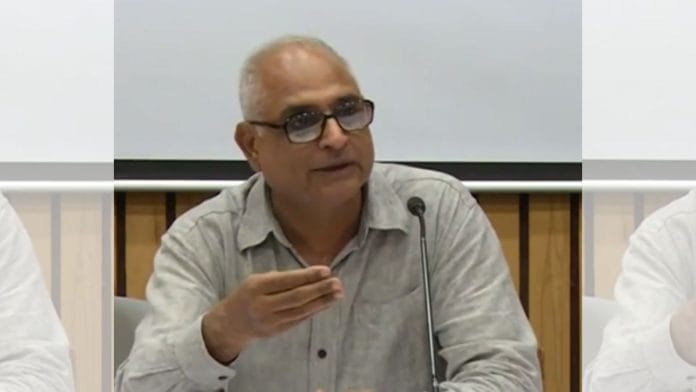New Delhi: J. K. Bajaj, a member of the Rohini Commission which was constituted to study sub-categorisation of Other Backward Classes (OBCs), has said that with the RSS withdrawing its strong objections, there is “no insurmountable obstacle” in the way of the government deciding in favour of a caste census.
However, he added that as and when the government starts the process, it should do so in a systematic manner. “We should not once again end up with the kind of messy data on caste that was returned in the Socio Economic Caste Census (SECC) of 2011,” he said in an interview with ThePrint.
“SECC 2011 was done without first preparing comprehensive lists of castes. The enumerators entered whatever caste-names the respondents gave. This led to entry of several lakhs of caste-names in the data,” continued Bajaj. “Consequently, the government found the data to be unusable, though data on other socio-economic aspects obtained in that census was extensively used for targeting the welfare programmes of the government. We should not end up in that situation again.”
Bajaj, the director of Chennai’s Centre for Policy Studies, was one of four members of the commission led by former Delhi High Court chief justice G. Rohini, which was set up to examine issues linked to sub-categorisation of OBCs and ensuring equitable distribution of reservation benefits. The Rohini Commission submitted its report to President Droupadi Murmu on 31 July 2023. It has not been made public so far.
Bajaj said that for a caste census to return meaningful data, it is crucial that the enumerators carry comprehensive lists of caste-names, preferably in the handheld devices which are likely to be used in the next Indian census. This would require preparing comprehensive lists of all caste-names separately for each of the states and Union territories of India.
“We already have such lists of Scheduled Castes (SC) and Scheduled Tribes (ST) for whom we have always been including the caste question in our decennial censuses. We have the lists for OBCs also. But for OBCs, there is a separate list prepared by the states/UTs for the purpose of reservation at their level and there are lists prepared by the Centre for reservations at the central level,” Bajaj said. “For the purpose of the caste census, these two OBC lists for each state/UT shall have to be appropriately combined.”
He further said that there are no such lists for the general category, and for the caste census to be meaningful, a list of the general castes in each state/UT will also have to be prepared.
“We have very comprehensive caste lists from the pre-Independence censuses. We also have the comprehensive lists of castes prepared by the Anthropological Survey of India for their People of India project. When Karnataka began preparing for its caste census in 2015, the government first prepared a complete list of castes in the state. This is a painstaking, but not impossible task,” he told ThePrint.
Bajaj said many of the castes in the general category have been demanding inclusion in the OBC, SC or ST lists. “The census should provide us with the necessary data to decide on their claims. It should also give us a fair picture of the relatively backward castes within the general category,” he added.
While including the question on caste in the national census, a question on the benefits of reservation in the job appointments or admissions to educational institutions availed by the household should also be included in the questionnaire, Bajaj suggested. He is of the view that the data on the benefits of reservation availed by different communities should be obtained and compiled on a continuous basis.
“I hope that now that the government is veering towards conducting a caste census, it should also consider setting up a digital registry, so that every appointment or admission and every grant given under the various quotas is logged in, along with the caste name and other details of the beneficiary,” Bajaj said.
Such data, according to him, would go a long way in painting a comprehensive picture of which caste obtained how much through the extensive system of social inclusion that independent India has pursued for several decades. “This data, along with that collected through the caste census, shall allow us to resolve many intractable issues concerning caste-based deprivation that keep arising in the polity.”
Bajaj said a caste census is also likely to give valuable data on how inclusive government policies have been. “I believe that the census and the data on benefits of reservation availed by different communities would prove that our social inclusion policies have indeed led to considerable upliftment of many backward communities. It would also allow us to further target our policies to benefit those who continue to be left behind.”
(Edited by Mannat Chugh)
Also Read: RSS says no issue with caste census if needed for welfare, but shouldn’t be used as political tool







Caste politics will destroy india future.
Rahul Gandhi saying in USA, skilled person don’t get respect in india and in india he wants reservation for non skilled, caste census.